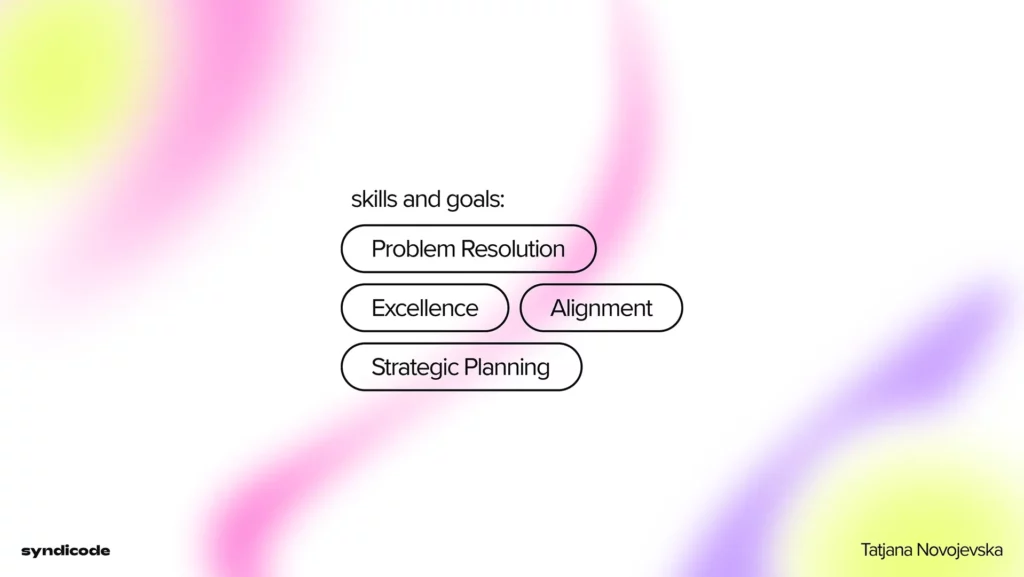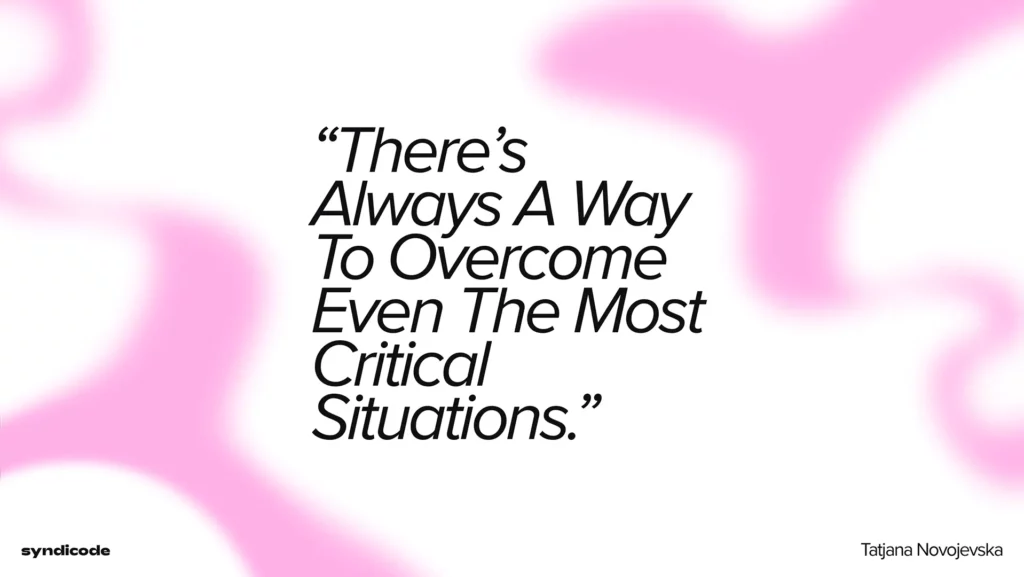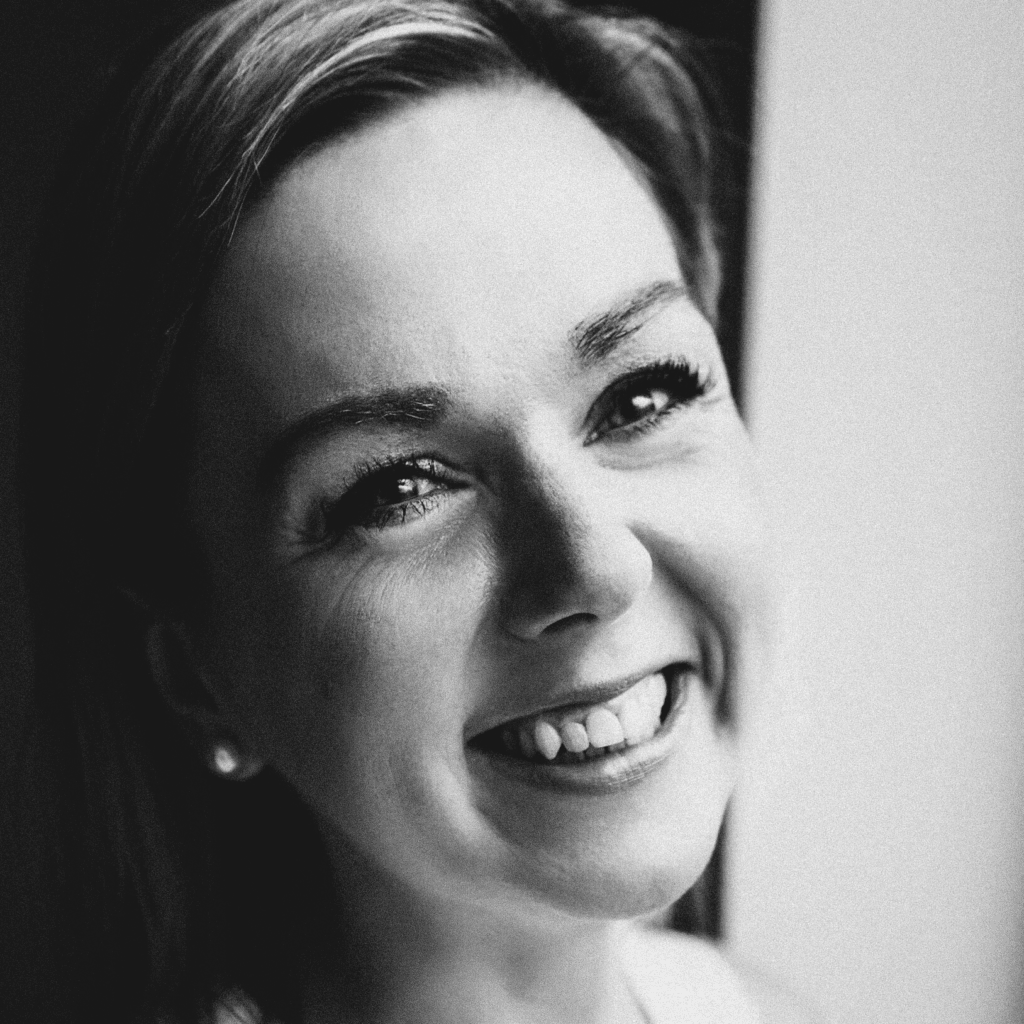Tatjana Novojevska oversees all the processes involved in the delivery of a software development project. In other words, she orchestrates human endeavors to ensure that their work is synchronized toward a specific goal.

What are your responsibilities within the company, and what does your typical workday look like?
At a high level, my role involves ensuring Syndicode’s engineering team delivers high-quality services to all its clients by overseeing processes, operations, and problem resolution. Additionally, I am a direct manager to the heads of project management, quality assurance, and business analysis teams.
Typically, my day consists of numerous project meetings and brief calls with my team.
I usually start my day by planning tasks for the upcoming day or week while also receiving updates from the Delivery Team. Throughout the day, I connect with Project Managers, Solution Architects, and the Head of Quality Assurance to ensure we are aligned in our delivery approach and that we address any pressing issues in a timely fashion.
In addition, I allocate some of my time to strategic planning calls with other departments at Syndicode, including HR, Finance, and the CEO. As the Key Account Manager, I also interact with clients.
Every day, I dedicate some time to reviewing the results of our delivery projects to identify areas that require improvement or attention. For example, I am currently focusing on reviewing and enhancing our contracts and devising a new way of working that addresses areas for improvement we have identified in our delivery.

Do you think there is a difference between the terms “Delivery Head” and “Delivery Manager?”
I think every organization has its own definition and understanding of job titles and responsibilities. In the context of IT software engineering, the general understanding of the roles of Head of Delivery and Delivery Manager is as follows.
Head of Delivery typically refers to an executive-level role responsible for overseeing the overall delivery of services within a company. This includes managing a delivery department or structure that encompasses all the services in the company’s portfolio.
For example, at Syndicode, the Delivery structure comprises Technology Consulting and R&D (outsourcing and outstaffing) services.
On the other hand, a Delivery Manager is typically responsible for managing the delivery of a specific product or service to a client.
What motivates your career choices so far?
My guiding principle has been the pursuit of constant improvement and new experiences. I tend to get bored when there are no challenges in my work.
I firmly believe that the best way to acquire new knowledge and skills is by overcoming obstacles. Additionally, working with people has always been an important aspect for me.
What do you like the most about your work at Syndicode?
The Syndicode team is comprised of highly motivated people who are committed to their business. It’s a pleasure to work with them.

What was it like to start this position at the onset of the global recession?
I believe that stability is an illusion as there will always be crises arising every now and then. I am confident in my ability to overcome both personal and organizational challenges.
As soon as I became familiar with Syndicode, I knew immediately how I could assist this company, so I had no doubts about accepting this position.
What is your vision for Syndicode’s project delivery?
As I previously mentioned, we are currently working on Syndicode’s new SDLC, precisely our method of delivering value to clients. I envision our new SDLC to not only present a process to follow but also to embody Syndicode values such as excellence, accountability, involvement, and a win-win approach.
My goal is for us to deliver real value to our clients and help make their businesses successful while also enjoying our work. That’s why my team and I dedicate substantial time to reviewing our past and current projects, constantly seeking ways to improve them.
What are the top three priorities for your unit?
Focus on teamwork, focus on our client’s goals, and continuous improvement.
“Get things done.”
– Tatjana Novojevska, Head of Delivery at Syndicode
What background is the most beneficial to transition to a delivery head/manager role?
A head of delivery has to be a good manager. Therefore, it is essential to have experience in project management and delivery, ideally in several different roles.
The more complex and challenging your previous projects, the better manager you are. People management is another crucial skill.
What is your strategy for handling emergencies when software delivery falls apart?
It is important to remember that there’s always a way to overcome even the most critical situations through workarounds, fixes, or other emergency management methods.
Not to forget, communication is crucial as well; it’s important to inform all stakeholders and assure them the situation is being handled.
One of the most severe situations I faced was the loss of critical project personnel just days before the go-live date. Several team members tragically passed away, and I was under a heavy emotional load. I immediately approached management for help, and we were able to find remote support. I also informed the client about the situation and our action plan. It wasn’t easy, but we managed to launch the project successfully.
How do you manage to maintain a work-life balance?
I balance my workload by working longer hours one or two days a week and leaving free evenings for outings, socializing, and attending events. Additionally, I take breaks during the day and try to spend more time outside.
Effective time management and prioritizing are the cornerstone of my well-being.

What helps you recharge after work?
I prioritize self-care and maintain a routine that includes waking up early, meditating, running, and practicing yoga. I give fitness and yoga classes at a local gym four times a week as a side hustle, which helps me to switch off from my work mode.
My other interests include personal growth and neuroscience, so I read a lot in that field, listen to podcasts, and take courses from Jim Kwik, Vishen Lakhiani, Stephen Covey, Simon Sinek, and others.
